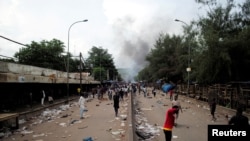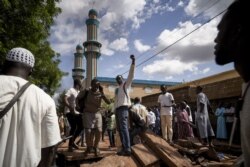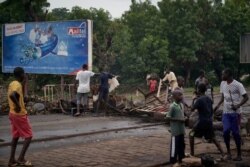Envoys from Mali's neighbors led by former Nigerian president Goodluck Jonathan were scheduled to arrive in Bamako on Wednesday in a bid to mediate in an escalating political crisis ahead of new high-risk protests.
Representatives from the 15-nation Economic Community of West African States (ECOWAS) are having to bridge apparently irreconcilable differences between President Ibrahim Boubacar Keita and a protest movement that is demanding his resignation.
Fresh protests have been set for Friday, a week after demonstrations that ignited three days of clashes with the security forces, leaving 11 dead and 158 injured, according to an official tally — Mali's bloodiest toll from political unrest in years.
The so-called June 5 Movement, an alliance of political, social and civil-society leaders gathered around a powerful imam named Mahmoud Dicko, is tapping into deep-seated anger.
Malians are worried and frustrated by an eight-year-old jihadist insurgency that has claimed thousands of lives and driven hundreds of thousands from their homes and swept into Niger and Burkina Faso.
Many are also incensed at perceived government corruption and the outcome of long-delayed parliamentary elections in March and April that handed victory to Keita's party.
A rally on Friday will be a "ceremony of sacrifice and of prayer" for protest victims, opposition leader Mountaga Tall told reporters on Tuesday after opposition figures were released after several days in detention.
"He who asked for us to get killed is no longer our president," he said.
"We are convinced that President IBK has neither the intellectual nor the physical capacity to lead the country," he said, referring to the head of state by his initials.
Several barricades were set up in the capital Bamako after he spoke, and some tires were burned, but otherwise the city was calm on Wednesday.
Keita's office said that the ECOWAS delegation would include constitutional experts.
One of the potential solutions being explored by the authorities is to appoint new judges to the Constitutional Court, a tribunal that is a major target of protest anger.
The court tossed out about 30 results of the legislative elections in a move that handed seats to members of Keita's party.
An ECOWAS mission to Mali last month concluded that the court's decision was "at the root of the tension" and called on the government to review the contested results or stage new elections as soon as possible.
It also called for a "consensus government of national union."
These recommendations have found a broad echo in the international community.
Keita, for his part, has made several gestures toward the June 5 Movement, including the dissolution of the Constitutional Court to enable a U-turn on the contested seats.
However, the dissolution creates legal as well as political complications, which the expected constitutional experts may be able to resolve.






